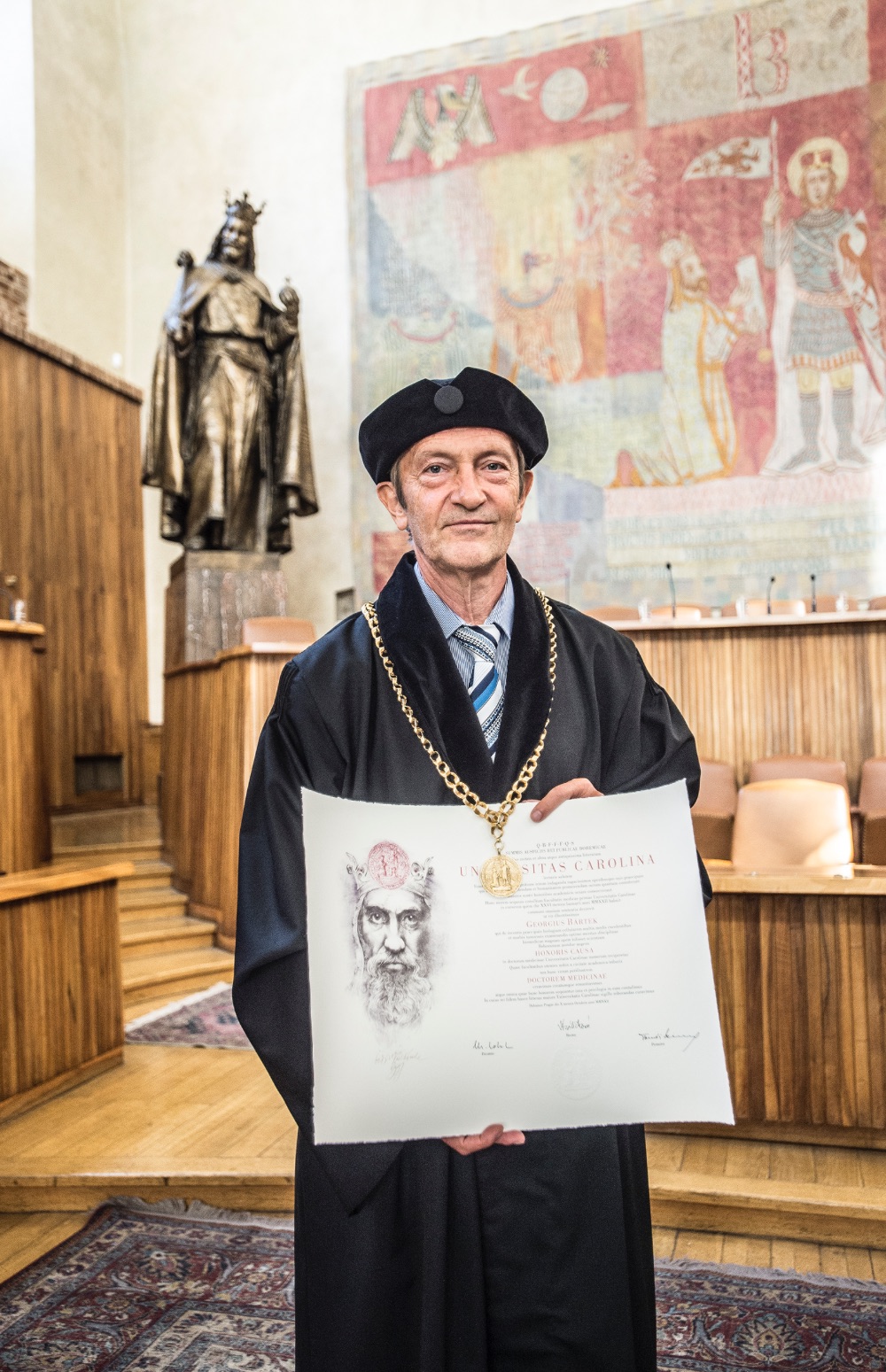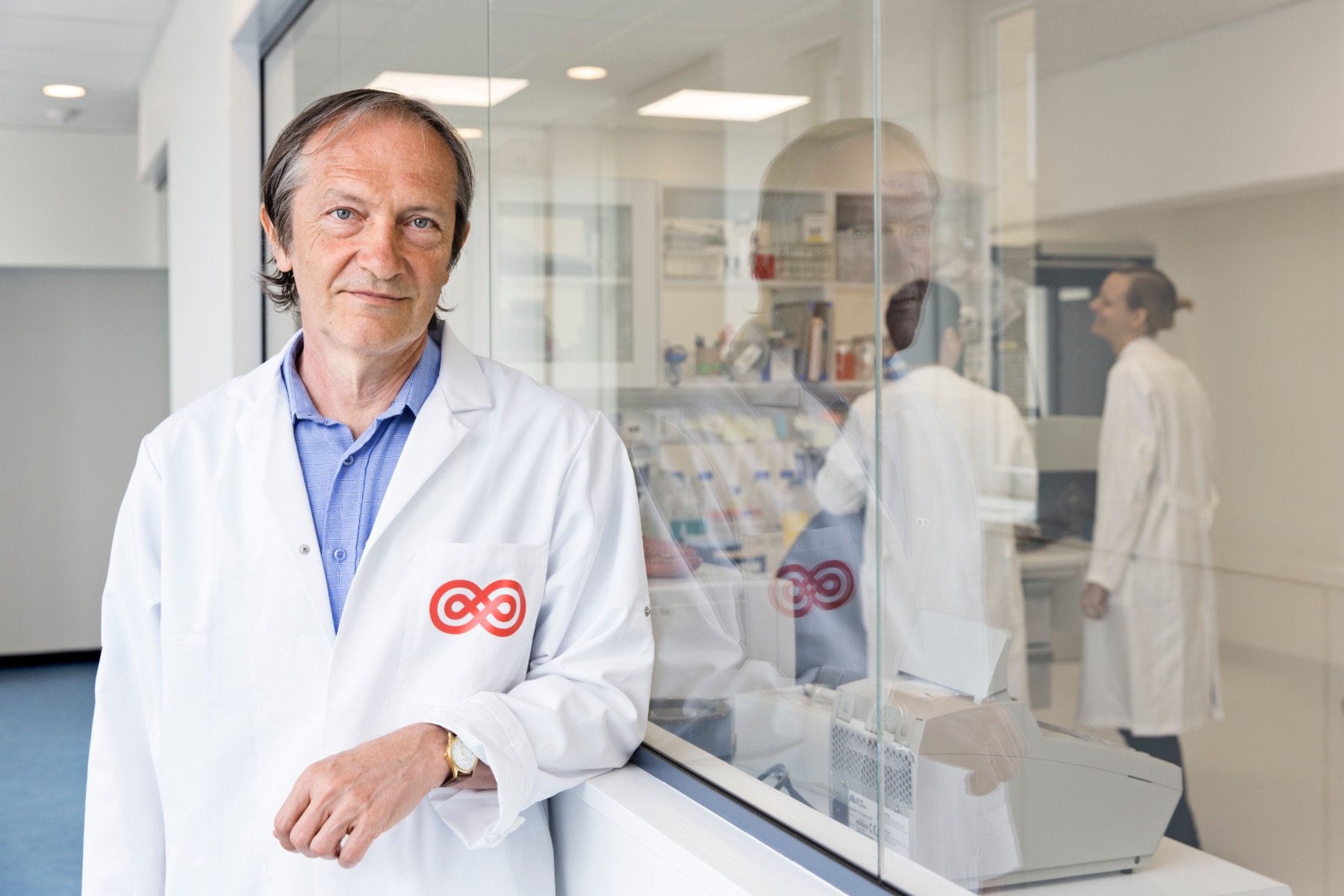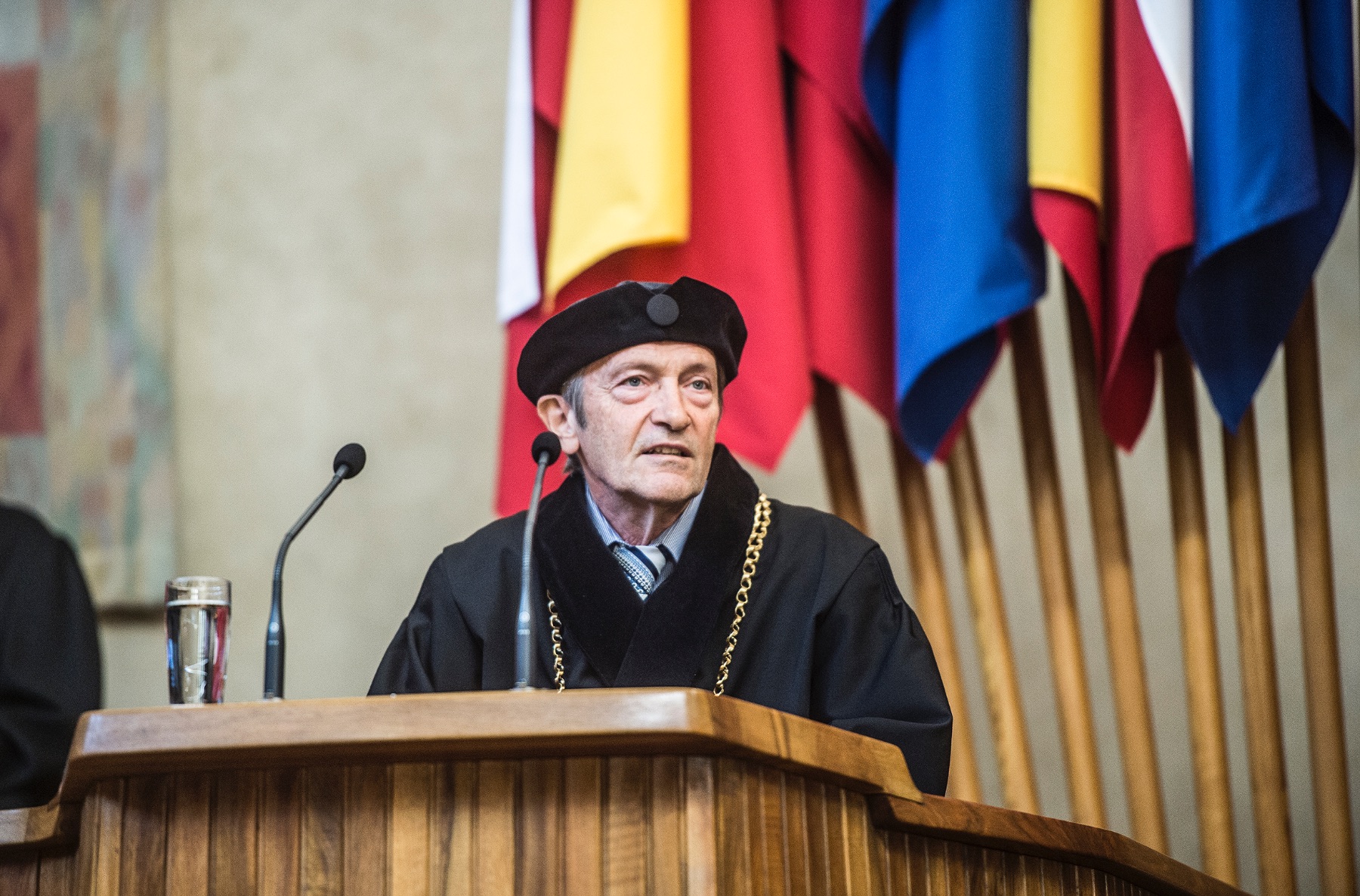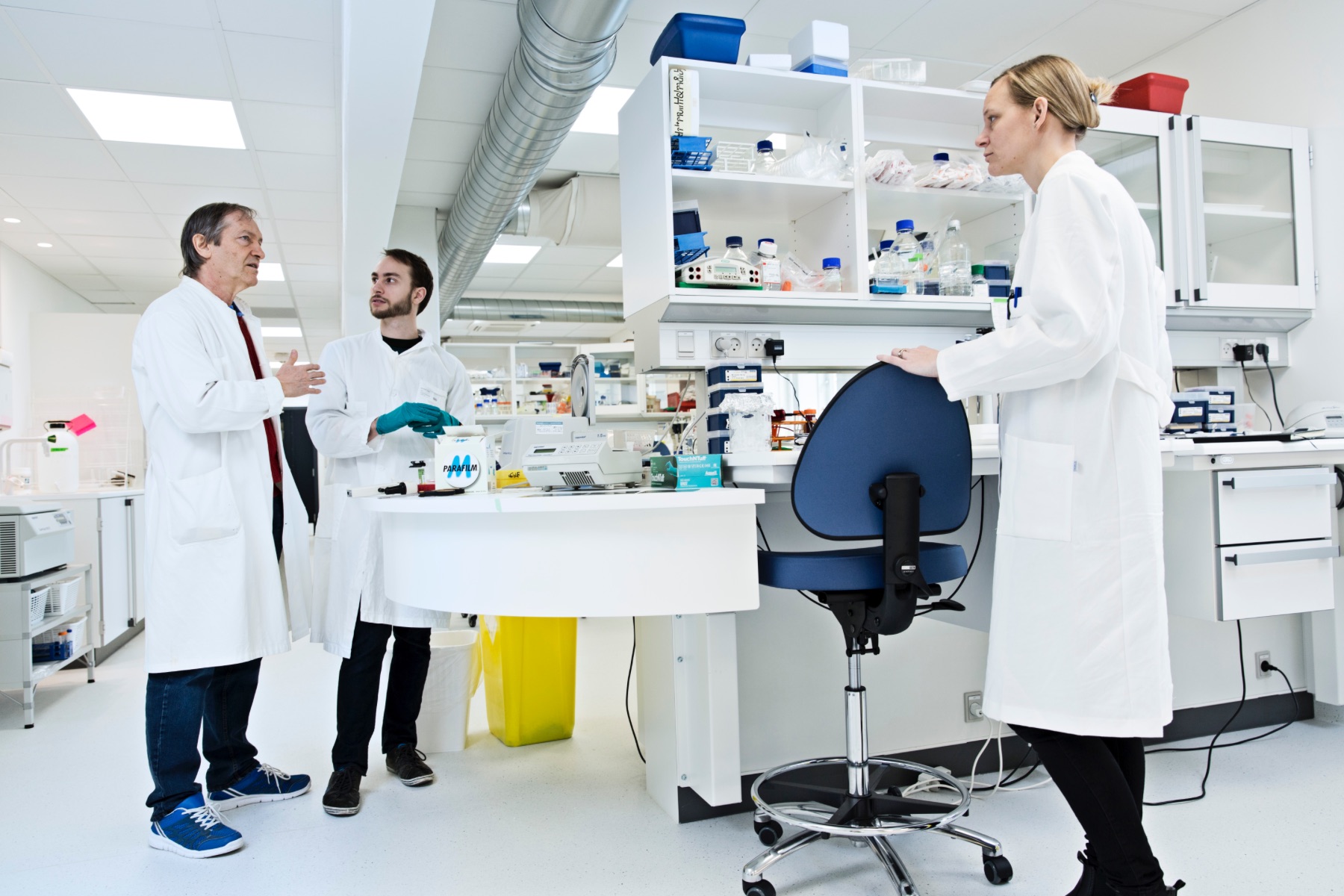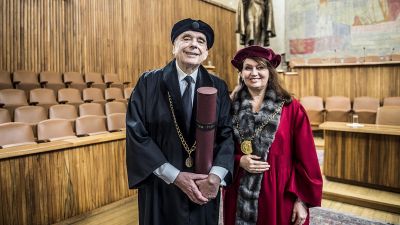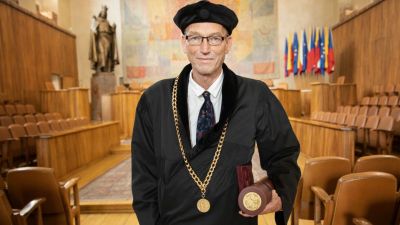“New technologies present enormous opportunities, but also risks. They can provide huge amounts of data, but sometimes the biological component disappears. I have always been fascinated by basic mechanisms and to understand how things work inside the cell. And sometimes even completely banal experiments are enough to do that,” says cell biologist Jiři Bártek, the most cited Czech scientist awarded an honorary doctorate from Charles University in 2022.
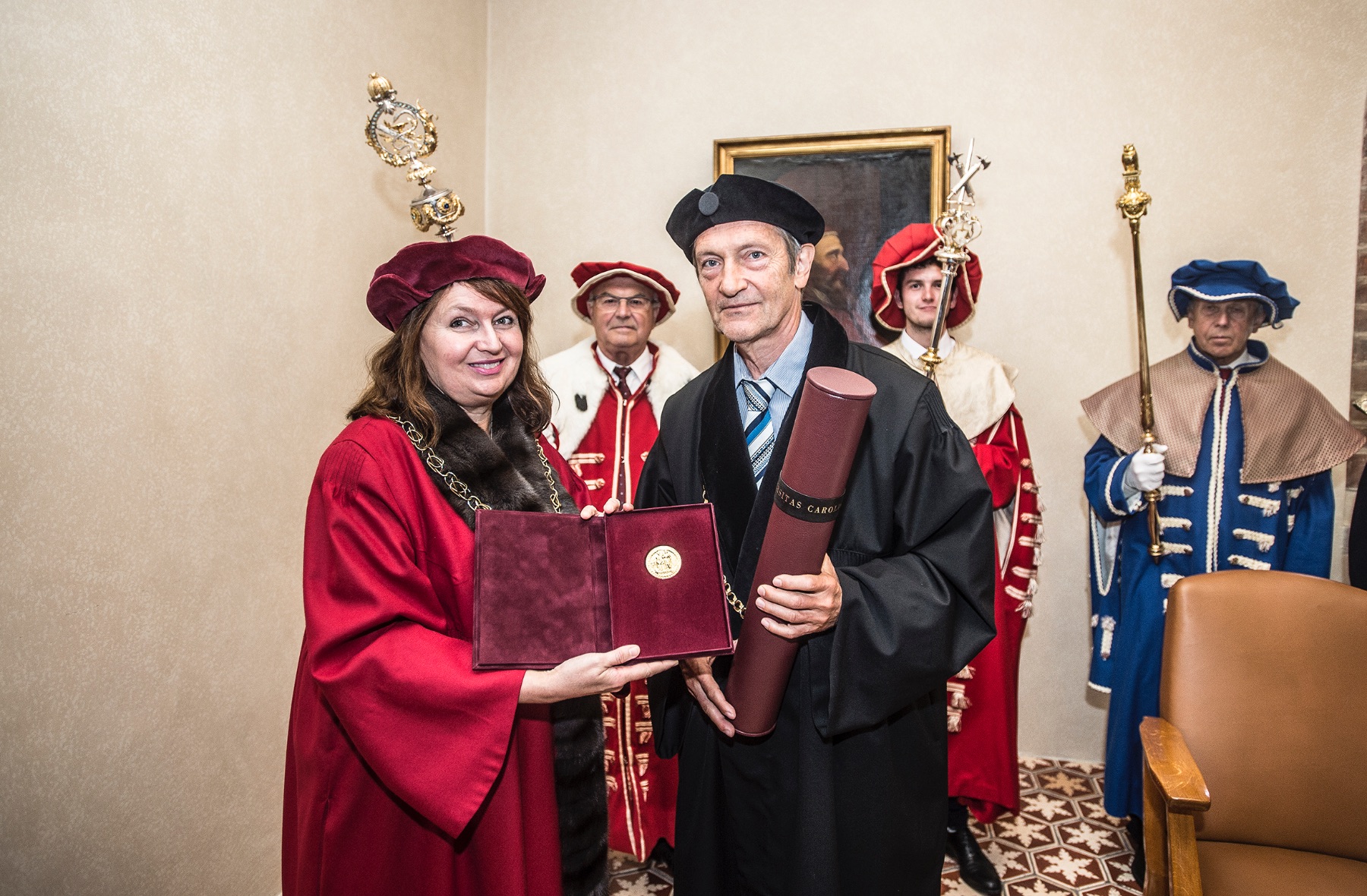
Professor Jiří Bártek with CU Rector Milena Králíčková in October, when he a was awarded an honorary doctorate at the Carolinum.
Last October, you received an honorary degree and the title of Dr.h.c. of Charles University in the field of medical science for pioneering discoveries in the field of cell biology and cancer and for your long-term assistance to Czech science. How did you feel?
It is an honour that I appreciate very much. It was wonderful because it gave me the chance to visit back home and meet friends as well as many new faces that I appreciate all the more after the Covid pandemic. It is also encouraging as well as a commitment that Charles University and the Czech Republic are still counting on me.
You mentioned in your speech that receiving the doctorate was an incentive for further cooperation. Do you have any concrete plans?
Although I have been working abroad for almost 30 years, I am still in contact with Czech institutions – we cooperate on numerous projects, I come here to give lectures, and Czech students come to my laboratories abroad. With Olomouc, for example, we now have a number of plans to go into practice, into cancer treatment. With Charles University, it is mainly cooperation on basic cancer research, but also on the aging process.
The list of your research topics and discoveries is enormous and overwhelming. If you had to pick one project that is significant to you, which one would it be?
That’s a really hard question, but what I consider significant, based not only on my own feelings but also on feedback from the scientific community, is something we call replication stress. We’ve been able to discover what drives tumour development and published two papers on this in Nature about 15 years ago. Cancer is a multi-step affair, and we described that the first change – usually the activation of an oncogene caused by, for example, the presence of toxic substances in the environment, smoking, radiation or a metabolic change – causes chaos in the process of genomic DNA replication, replication stress, which the cell detects. And it responds to this “danger of tumour transformation” state.
The cell tries to solve the problem, but if the changes in the DNA are too great, it will commit suicide rather than endanger the whole organism. The problem arises when these control mechanisms stop working, this then leads to uncontrolled cancerous division, which produces further stress, chromosomal breaks and DNA mutations. We can measure replication stress and, as it is specific only to cancer cells, this has opened up a new area of research and also pointed to the possibility of treating tumours. Today there are already hundreds of follow-up papers on this topic, which makes us very happy because we actually started this new research direction.
You also mentioned in your address at CU that you are pleased that you have spurred competition over the years.
Yes, that is true. We have been able to discover and develop several research lines that did not exist before. My groups have always been very international – there have been times when I have had people from 13 different countries in one group! So nowadays my students are really all over the world, which of course is the competition – we’re competing for the same grants, but at the same time it’s wonderful and I’m extremely pleased that it ensures continuity of research on these topics.
How much has the whole field of cancer biology changed during your career?
A lot has changed. In terms of technology and new methods, we have seen a complete revolution that we never dreamed of. It brings new research opportunities, but at the same time it has an impact on the way science is done. One can no longer be an expert in everything and large interdisciplinary teams are needed. Which is sometimes funny when you see publications with hundreds of authors… It’s a thing of the past when key discoveries, even Nobel Prize-winning discoveries, were made by one person alone or by a very small group. But technology also presents inherent risks: it tempts us to produce huge amounts of data from which the biological essence disappears – why? The thing that has fascinated me most about science from the beginning is the basic biological mechanisms, trying to understand how things work in the cell. And sometimes even very simple experiments are enough to do that.
I try to teach this way of thinking to my students as well. And a big change is the GDPR (General Data Protection Regulation) rules, for example, which complicates clinical research in a huge way. In Denmark, the situation is really critical; there is a risk that such research projects will be very limited or even stopped because there are too many obstacles. This may hinder the development of new drugs, but it also reduces our scientific competitiveness, because non-European countries do not have such strict rules.
As the most cited Czech scientist, how do you perceive scientometrics? Do you consider it important?
It is certainly a useful thing, but it has its limits. If there was something better, something else would probably be used, but so far no better "metric" for scientific productivity has emerged. One should keep in mind that scientometrics can be manipulated to some extent and one can artificially increase one’s citation rate. Some people are already taking advantage of this and writing review articles instead of articles about their own discoveries. And this spins a vicious circle, because publications are only allowed a limited number of citations, so instead of original work – and real discoveries – you are forced to cite review articles.
You work closely with your wife, Jiřina, on some of your research, and your children are also working in science. What do your family get-togethers look like?
In recent years, everything revolves around the grandchildren, so it’s not so different from other family gatherings. But to a certain extent, our scientific passion shows. My son is a neurosurgeon, he works at the Karolinska Institutet hospital and we collaborate directly on a number of projects. It’s a perfect combination of research in the lab and clinical practice. My daughter is more into environmental issues: she is currently working on the issue of bacterial resistance to antibiotics, which is a huge problem. We discuss science with her too and I’m happy to learn about what she’s working on at the moment, and in return I can hopefully give advice on project strategy or grant applications, for example.
And I’m very happy to work with my wife: in the beginning I worked so much that if we hadn’t worked together we would hardly have seen each other… It’s an advantage that we both know the scientific environment, we have a common goal and we know that when you want to achieve something, it comes with some sacrifices. Moreover, my wife comes from a family of scientists, so she knew what she was getting into (smiles).
You have long been talked about as a possible candidate for a Nobel Prize, practically the only one of Czech origin. Do you ever admit this possibility?
I don’t think about that at all. Anything can happen, but the chance is extremely small. One of the laboratories I run in parallel is at Karolinska University in Stockholm, where the Nobel Committee for Physiology and Medicine is based, and which selects from several hundred nominations every year. The members of the committee spend many months on this, it is a very thankless job. Occasionally, I am asked to come in as an external member and do a review of one of the nominations, and even that takes a lot of time.
You also mentioned in your speech that you were very motivated by the biographies of famous doctors and scientists. Do you have any favourites that young scientists today should read about?
There are many examples, and I go back to them from time to time. They are the stories of Pasteur, Koch, Fleming, or Banting, who discovered insulin, and many others. For example, the story of Hans Selye, a physician, biologist, chemist and endocrinologist of Austrian-Hungarian origin, who also studied in Prague and in his book From Dream to Discovery (published in Czech as K záhadám vědy by Orbis, 1975) describes how he worked – how he discovered stress, what motivated him, how he assessed the adepts for his laboratory and other valuable insights and reflections on how science is done.
You have already gathered a lot of foreign experience. What should inspire science in the Czech Republic?
In the Czech Republic, but also in some other countries, there is still too much administration, which complicates our lives. For example, reporting on grants: in Denmark, when I get a grant very little reporting is required. As long as I obtained important results, no one minds that I deviated from the original plans. In the Czech Republic, however, I have to explain why I used twenty mice instead of thirty… This meticulousness is, I think, very detrimental. And we should also think more about how to attract Czech scientists who gain experience abroad back to their homeland – to make the conditions and quality of life in Czech science attractive and comparable to those abroad. We could gain a lot from this.
| Professor Jiří Bártek, CSc., dr.h.c. mult. |
| Jiři Bártek is a world-renowned expert in cell biology and cancer research. His research topics are mainly related to cell cycle regulation, the mechanism of recognition and response to genomic damage, and mechanism of tumour initiation and progression, including the discovery of some molecular functional features of cancer cells that can be used as targets for new treatment directions or as potential biomarkers in oncology. He is currently the most cited scientist of Czech origin. His scientific productivity is evidenced by an H-index of 126, around eighty thousand citations and more than five hundred publications in international journals – including the prestigious titles Nature, Cell and Science. He graduated from the Faculty of General Medicine at Palacký University in Olomouc, and received his CSc. degree at Charles University. In addition to his thirty-year tenure at the Danish Cancer Society Research Institute in Copenhagen, he also leads a research team at Karolinska Institutet in Sweden, works at the Institute of Molecular Genetics of the Czech Academy of Sciences in Prague, and until 2021, he headed a laboratory at the Institute of Molecular and Translational Medicine at the Faculty of Medicine of Palacký University in Olomouc. In October, he received an honorary doctorate from Charles University. |


